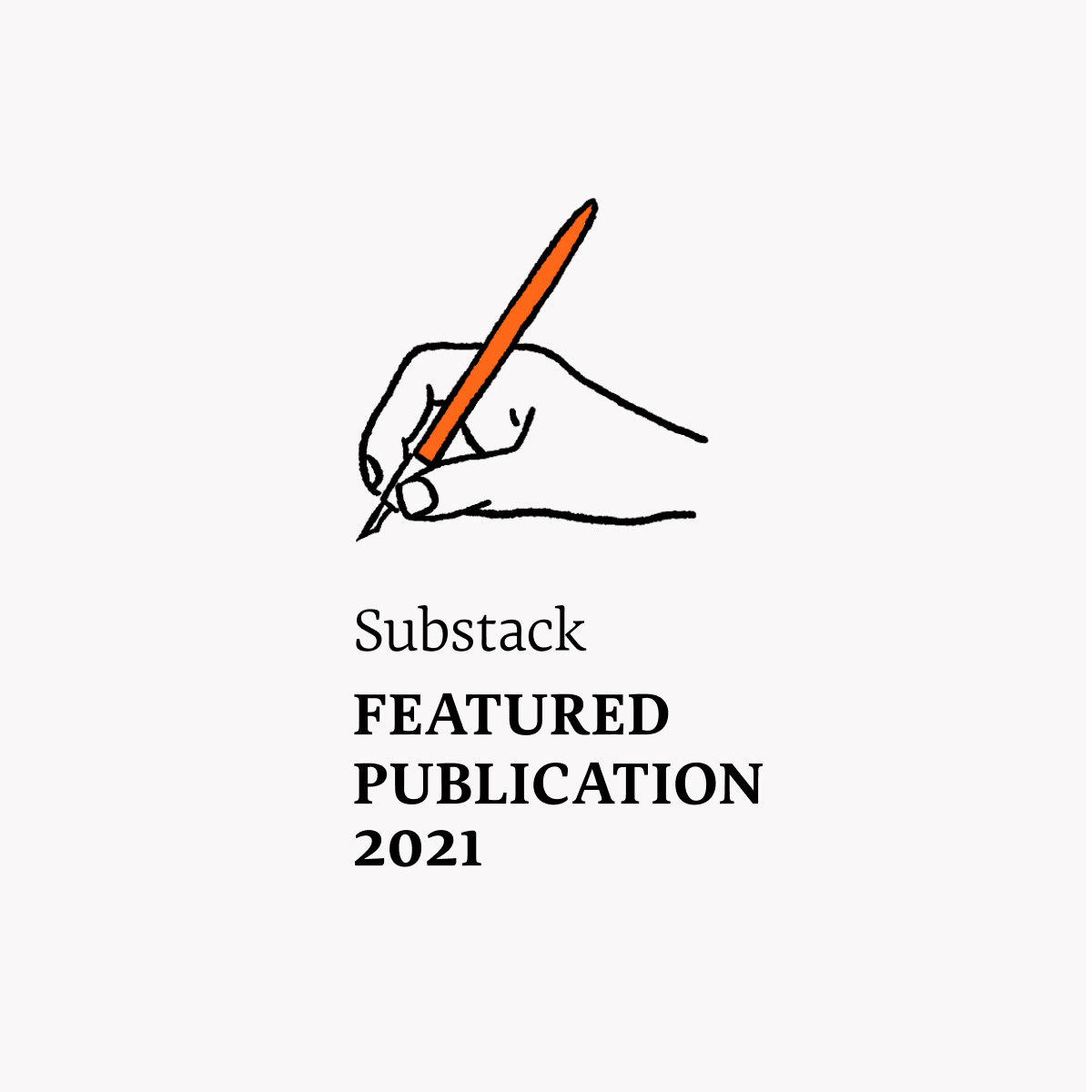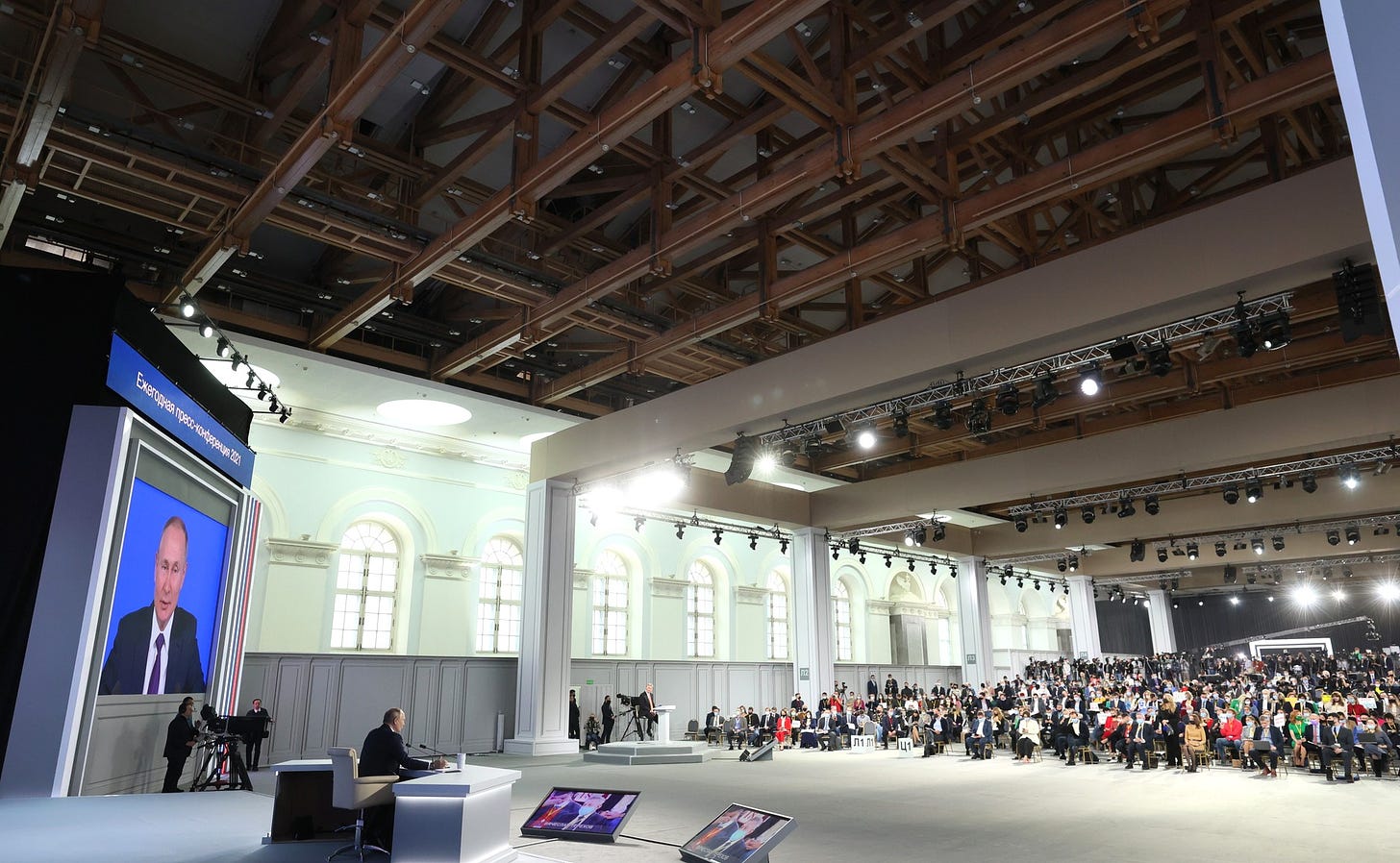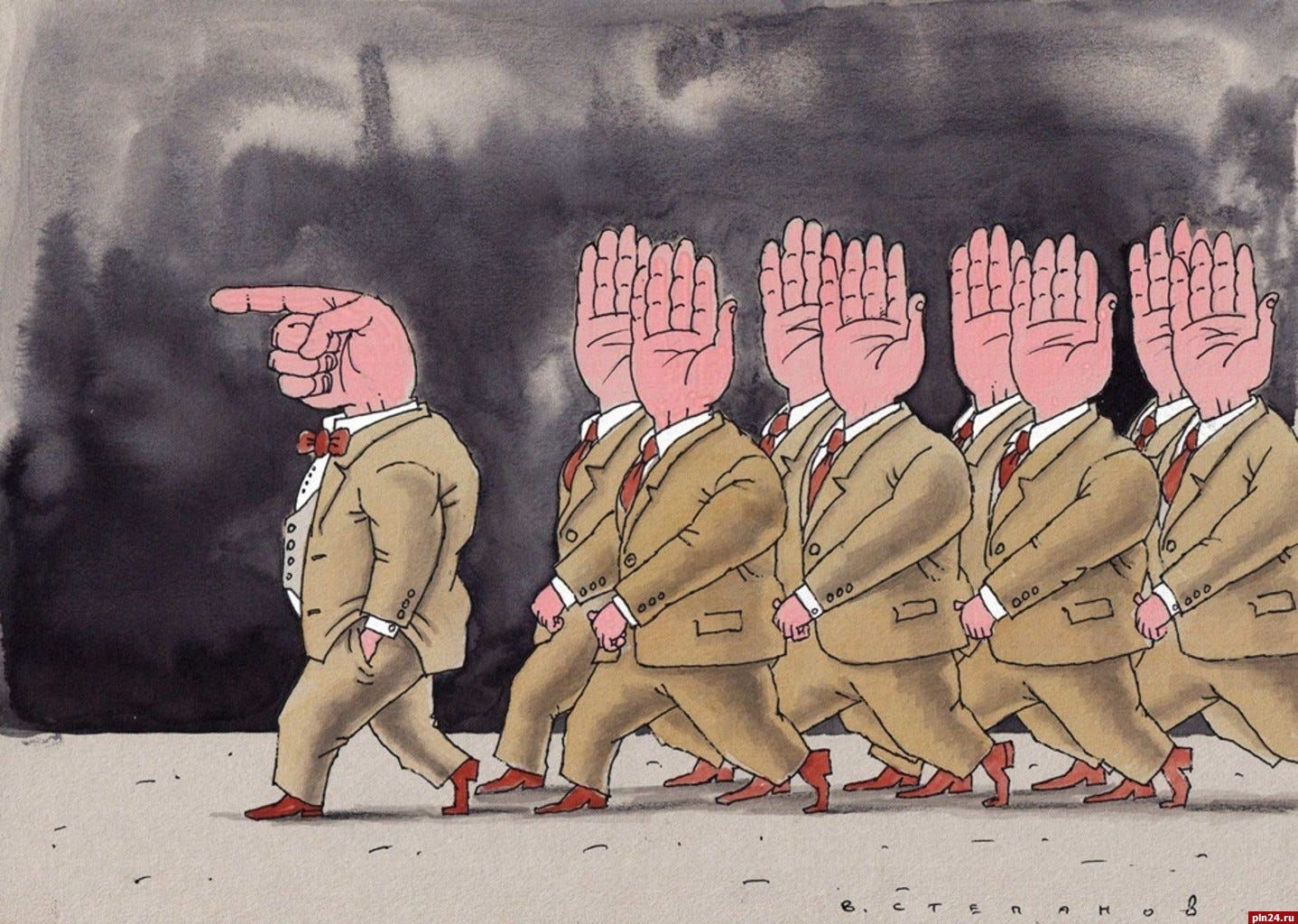What he did NOT say. Like in the good Soviet times...
December 27, 2021 (instead of Weekend Essay)
What he did NOT say
On Thursday, December 23, Russian President Vladimir Putin held his traditional press conference, which lasted four hours. I can’t say that I heard anything new. Three NOs caught my attention:
1) Dmitry Muratov, Editor-in-Chief of Novaya Gazeta and this year’s Nobel Prize winner, was not invited to the press conference. “...we forgot to call them,” said the President’s Press Secretary, Dmitry Peskov.
2) After facing a question—“Can you unconditionally guarantee that you really will not attack Ukraine or any other sovereign state?”—Putin didn’t answer YES, saying: “Regarding guarantees and whether anything will depend on the course of negotiations. Our actions will not depend on the course of negotiations, but on the absolute security of Russia today and for the historical perspective.”
3) Putin did not answer the direct question of whether Russia would recognize the Taliban, stating Russia’s position as follows: “I would like relations between Russia and Afghanistan to develop in the best possible way... But as for the recognition, on the whole, we must proceed from the realities, proceed from the fact that those forces that ended up at the head of Afghanistan will be determined to have all ethnic groups represented in the leadership of the country.”
Goodwill gesture
The Kremlin continues to voice its insistence on “security guarantees” from the West, backing them up with news about the successful salvo launch of the Tsirkon anti-ship hypersonic missiles and President Putin’s words that Russia will prepare a military response if such guarantees are not given.
At the same time, the Kremlin decided to slightly reduce the activity of its military operations on the Russian-Ukrainian border, which have been causing anxiety and concern in Kyiv and Washington in recent weeks. At the end of last week, the Defense Ministry reported that in connection with the completion of field training, “more than 10,000 servicemen in their units will march to their permanent deployment points from the territory of the firing ranges,” which are located in the Rostov region (on the border with Donbas) and in Crimea, among other places.
An unexpected interpretation
In an interview with RIA Novosti, the Director of the Second CIS Department of the Russian Foreign Ministry, Alexei Polishchuk, said: “Now there are about 10,000 NATO troops stationed at military facilities and naval bases in Ukraine, four thousand are from the United States... This directly violates the 2015 ‘Package of Measures to Implement the Minsk Agreements,’ according to which all foreign armed formations, military equipment, and mercenaries should be withdrawn from the country on the contrary.”
I must admit, this is an exquisitely torturous interpretation of the Minsk agreements. This document, in my opinion, is thought to define the conditions for ending the bloody conflict in Eastern Ukraine. But let’s formally read paragraph 10 of that document, which says that “the withdrawal of all foreign armed formations, military equipment, as well as mercenaries from the territory of Ukraine under OSCE observation” must be carried out. It turns out that the Russian diplomat’s reading is correct. And we should expect this argument to be presented by the Russian delegation at the negotiations regarding the “security guarantees” for Russia that Vladimir Putin is seeking.
“Like in the good Soviet times...”
In December 1991, the Soviet Union disappeared. At the time, it seemed to me to be the final collapse of the ideological state and the command economy. But 30 years have passed, and the head of the Soviet hydra has grown back.
Here’s Deputy Prime Minister Marat Khusnullin describing present realities to the TASS news agency:
“...every Thursday [I] hold a meeting with the governors [Question: And how many regions usually participate?] All without exception… I keep statistics on each one.
At the end of the year, I make a traffic light which I bring to the President. He sees everything at once... I divide all the regions into three blocks. The green ones exceed the national average [fulfillment of formal indicators in eight programs that Khusnullin oversees]. The yellow ones are the group between the leaders and the laggards. In the red sector are those who are not pulling their weight... A paper is placed on the President’s desk, from which he can see who of the governors has performed well...
“Last year, we strictly focused on the eight regions that have not fulfilled their obligations to construct and repair roads. Two vice-governors were removed from their jobs, three regional ministers and five customers [were fired]. Just like in the good Soviet times, when people were fired for failing to perform a task, they were forced to put on the table their party membership cards...”
“Like in the good Soviet times...” Earlier this year, I read an interview with another Deputy Prime Minister, Victoria Abramchenko, in which she said: “I am in favor of a good Soviet Gosplan, which sees everything and can plan with minimal costs where it is needed.” At the time, I took it as a figure of speech. Well, what could someone who was 16 years old when that organization disappeared know about the Soviet Gosplan?
I closely follow the style of the meetings that Vladimir Putin holds with members of the government, paying special attention to what—and in what words—ministers of his government discuss at these meetings. And I am increasingly convinced that for Vladimir Putin, the collapse of the Soviet Union was not only “the greatest geopolitical catastrophe of the century” (as he proclaimed in 2005) but also the greatest managerial tragedy, the collapse of the most effective system of state administration.
For a few years, Vladimir Putin has been trying to restore Russia’s sphere of influence to the USSR borders. And now he has announced further ambitions to restore the Soviet system of government, which he believes to have been effective. The only question is why a country with an effective method of governance was not able to solve its economic problems and collapsed...
Problems you cannot hide
Three more fragments from Marat Khusnullin’s interview caught my attention because he talks about the imbalances that are growing in Putin’s Russia:
1) “From Moscow, we should not tell you what to do in each particular place... And we should not interfere at the level of the municipalities. Let them decide for themselves; they know people’s needs, they understand what needs to be done in the first place. But for this, the regions must have their own money.” It is hard not to agree with what he said. Only in his practice does Marat Khusnullin take away from the regions any possibility of making an independent decision about what a particular region needs. At the same time, his colleague, the Minister of Finance, Anton Siluanov, regulates 99% of regional budgets expenditures.
2) Question: “[Minister of Defense] Sergei Shoigu proposes creating large cities in Siberia from scratch. He has even picked up locations.
—In my opinion, we should not build additional megacities but improve the ones we already have. Any new large-scale project is a significant burden on the infrastructure.
—Do I understand correctly that you are against [this] idea?
—My attitude is... ambivalent. We must evaluate each individual case.”
Despite the absurdity of Shoigu’s idea, Marat Khusnullin is afraid to speak openly about it, knowing the close personal relationship between Shoigu and the Russian President.
3) “I see a terrible shortage of labor resources. Until 2020, more than a million migrants worked on construction sites alone. Many left, some came back, and you have to understand that in reality, a migrant works for 12 hours for the money we pay Russians for an eight-hour working day. And where am I supposed to take people?
Another example. Truck drivers’ salaries have increased to 80,000-100,000 rubles on the Europe-Western China route, but they are still not available. Migrants used to work on that route, but now they are in short supply. Our compatriots are not eager to work as truck drivers. They don’t want to drive gravel or sand from the quarry to the construction site for 12 hours, either. This is reality.”
Last week, discussing the investment plans of Vladimir Putin, (Weekend Essay, December 19, 2021) I said that labor shortages will be one of the main obstacles in their implementation. Marat Khusnullin confirmed my conclusion and said very frankly that it would be impossible to solve this problem without a meaningful migration policy. Nothing has been heard about that yet.
You will receive the next issues on December 28, and 30 and January 4 and 7.
From January 11, I will return to the traditional practice of publishing the digest Tuesday through Friday.






